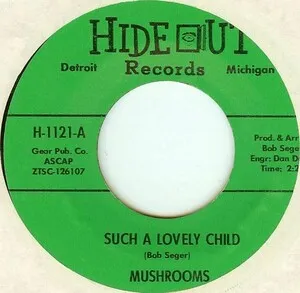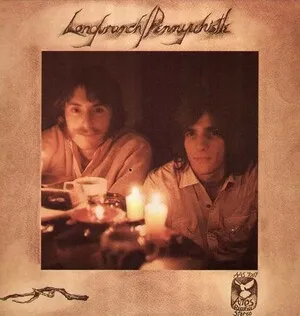Glenn Frey before the Eagles
Glenn Frey passed away on January 18, 2016 at age 67, from complications caused by rheumatoid arthritis, acute ulcerative colitis and pneumonia. Frey was the co-founder of the Eagles, who recorded some of the most popular songs of the 1970’s; Their Greatest Hits 1971-1975 is one of the top-selling albums of all time. In a statement, Eagles co-founder Don Henley said that Frey “was the one who started it all. He was the spark plug, the man with the plan.”
Although the Eagles defined the Los Angeles sound for the rest of the world, none of their members originally hailed from L.A. Before moving to Southern California, Frey played guitar in numerous bands as a teenager in and around his native city of Detroit, Michigan. One of those bands, The 4 Of Us, had earlier recorded two singles – the 1965 psych-surf track “You Gonna Be Mine” and the 1966 Byrds cover “I Feel A Whole Lot Better” – before Frey joined their lineup.
Frey recorded his first single in 1967 at the age of 18, with another Michigan band called Mushrooms. Frey sang the lead vocals and played guitar. Both sides of the single were written by Frey’s mentor Bob Seger, who was then a local sensation in the Detroit area. (Frey later played acoustic guitar on Seger’s 1968 song “Ramblin’ Gamblin’ Man”). On this single’s A-side, “Such A Lovely Child”, Frey sounded as though he had already begun his California dreamin’. With a hint of West Coast-style psychedelia (not to mention a bit of Byrds-like guitar jangle around the two-thirds mark), the song tells the tale of a woman who rejects affection in her youth, but longs for it later in life. Frey’s vocal manner on this song suggests that he was mimicking another singer, although it does not sound like he was imitating Seger. Neither the lyrics nor the sound predict the musical directions that either performer would become famous for in the 1970’s, but the song is interesting as an early work for both. The B-side, “Burned”, has more of a British Invasion-inspired sound, and a less mannered vocal by Frey. This song also does not sound very Bob Seger-like, although it is easier to imagine how this one would sound if rendered by the Silver Bullet Band.
Frey soon moved to Los Angeles. There he met singer/songwriter J.D. Souther, who would become a frequent collaborator with the Eagles. As a duo, Frey and Souther recorded a country-rock album in 1969 as Longbranch/Pennywhistle. On the self-titled Longbranch/Pennywhistle album, Souther and Frey shared vocal and guitar duties. The backing musicians – billed as “heavy helpers” – included Ry Cooder, James Burton, Buddy Emmons, Larry Knectel, and Doug Kershaw.
Although Souther wrote and sang the bulk of the material, Frey’s two songs are among the album’s high points, and they presage his work with the Eagles: “Run Boy Run” is an up-tempo tune about an outlaw on the lam, and “Rebecca” is a wistful So-Cal country ballad. Souther’s six compositions are respectable country-rock songs of a more rustic nature, highlighted by “Kite Woman” – which also has something of a proto-Eagles sound – and the singalong groove of “Never Have Enough”. Notably, the one song that Souther and Frey co-wrote, “Bring Back Funky Women”, is the album’s weakest track, suggesting that the duo’s chemistry had room to develop. Nonetheless, Longbranch/Pennywhistle was a good launching pad for two talents – particularly the one who formed the Eagles.
Update: Longbranch/Pennywhistle was reissued by Geffen in September 2018, in physical and digital formats.

Mushrooms "Such A Lovely Child" b/w "Burned" (Hideout single H-1121) 1967
Track Listing:
a. Such A Lovely Child
b. Burned

Longbranch/Pennywhistle "Longbranch/Pennywhistle" (Amos AAS 7007) 1969
Track Listing:
1. Jubilee Anne (Souther)
2. Run Boy Run (Frey)
3. Rebecca (Frey)
4. Lucky Love (Souther)
5. Kite Woman (Souther)
6. Bring Back Funky Women (Souther, Frey)
7. Star Spangled Bus (Souther)
8. Mister, Mister (Souther)
9. Don't Talk Now (James Taylor)
10. Never Have Enough (Souther)
Although the Eagles defined the Los Angeles sound for the rest of the world, none of their members originally hailed from L.A. Before moving to Southern California, Frey played guitar in numerous bands as a teenager in and around his native city of Detroit, Michigan. One of those bands, The 4 Of Us, had earlier recorded two singles – the 1965 psych-surf track “You Gonna Be Mine” and the 1966 Byrds cover “I Feel A Whole Lot Better” – before Frey joined their lineup.
Frey recorded his first single in 1967 at the age of 18, with another Michigan band called Mushrooms. Frey sang the lead vocals and played guitar. Both sides of the single were written by Frey’s mentor Bob Seger, who was then a local sensation in the Detroit area. (Frey later played acoustic guitar on Seger’s 1968 song “Ramblin’ Gamblin’ Man”). On this single’s A-side, “Such A Lovely Child”, Frey sounded as though he had already begun his California dreamin’. With a hint of West Coast-style psychedelia (not to mention a bit of Byrds-like guitar jangle around the two-thirds mark), the song tells the tale of a woman who rejects affection in her youth, but longs for it later in life. Frey’s vocal manner on this song suggests that he was mimicking another singer, although it does not sound like he was imitating Seger. Neither the lyrics nor the sound predict the musical directions that either performer would become famous for in the 1970’s, but the song is interesting as an early work for both. The B-side, “Burned”, has more of a British Invasion-inspired sound, and a less mannered vocal by Frey. This song also does not sound very Bob Seger-like, although it is easier to imagine how this one would sound if rendered by the Silver Bullet Band.
Frey soon moved to Los Angeles. There he met singer/songwriter J.D. Souther, who would become a frequent collaborator with the Eagles. As a duo, Frey and Souther recorded a country-rock album in 1969 as Longbranch/Pennywhistle. On the self-titled Longbranch/Pennywhistle album, Souther and Frey shared vocal and guitar duties. The backing musicians – billed as “heavy helpers” – included Ry Cooder, James Burton, Buddy Emmons, Larry Knectel, and Doug Kershaw.
Although Souther wrote and sang the bulk of the material, Frey’s two songs are among the album’s high points, and they presage his work with the Eagles: “Run Boy Run” is an up-tempo tune about an outlaw on the lam, and “Rebecca” is a wistful So-Cal country ballad. Souther’s six compositions are respectable country-rock songs of a more rustic nature, highlighted by “Kite Woman” – which also has something of a proto-Eagles sound – and the singalong groove of “Never Have Enough”. Notably, the one song that Souther and Frey co-wrote, “Bring Back Funky Women”, is the album’s weakest track, suggesting that the duo’s chemistry had room to develop. Nonetheless, Longbranch/Pennywhistle was a good launching pad for two talents – particularly the one who formed the Eagles.
Update: Longbranch/Pennywhistle was reissued by Geffen in September 2018, in physical and digital formats.
Mushrooms "Such A Lovely Child" b/w "Burned" (Hideout single H-1121) 1967
Track Listing:
a. Such A Lovely Child
b. Burned
Longbranch/Pennywhistle "Longbranch/Pennywhistle" (Amos AAS 7007) 1969
Track Listing:
1. Jubilee Anne (Souther)
2. Run Boy Run (Frey)
3. Rebecca (Frey)
4. Lucky Love (Souther)
5. Kite Woman (Souther)
6. Bring Back Funky Women (Souther, Frey)
7. Star Spangled Bus (Souther)
8. Mister, Mister (Souther)
9. Don't Talk Now (James Taylor)
10. Never Have Enough (Souther)
Comments